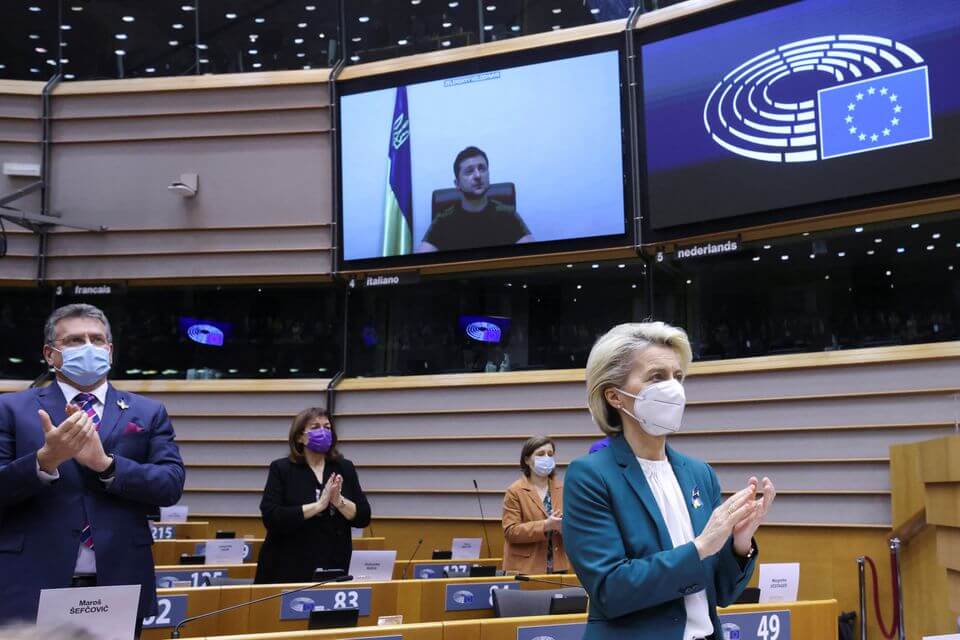On Tuesday, the European Parliament held an extraordinary session in Brussels, during which members of the European Parliament (MEP) approved a resolution imposing comprehensive sanctions on Russia, and providing Ukraine with additional humanitarian aid and weapons. The resolution makes way for Ukraine’s integration into the European Union (EU) after Ukrainian President Volodymyr Zelensky submitted a fast-track EU membership application amid Russia’s military onslaught on major Ukrainian cities.
The resolution received 637 votes in favour, 13 against, and 26 abstentions. The Parliament strongly condemned Russia’s “illegal” invasion of Ukraine and demanded that Moscow cease all military activity in the region. MEPs called on other EU institutions to begin working towards granting Ukraine the status of EU candidate, emphasising that Kyiv’s EU accession will take place on “merit.” At the same time, EU institutions will also begin integrating Ukraine into a single EU market in accordance with the EU-Ukraine Association Agreement that was adopted in 2017. Moreover, the Parliament decided to increase its defence and intelligence supply to Ukraine to help thwart Russian aggression, in addition to providing protection to Ukrainian refugees fleeing the war.
The resolution proposed the implementation of broader sanctions aimed at “strategically weakening” Russia’s finance sector and economy. The restrictions include blocking all Russian banks from the SWIFT international banking network and ceasing all new EU investment in Russia. The Parliament underscored that all of its restrictions also apply to Belarus for providing Russia vital support to carry out the invasion of Ukraine.
President @ZelenskyyUA signed #EU membership application for #Ukraine. This is the choice of 🇺🇦 and Ukrainian people. We more than deserve it. pic.twitter.com/FRhLTfyjvJ
— Denys Shmyhal (@Denys_Shmyhal) February 28, 2022
Maltese politician and European Parliament President Roberta Metsola affirmed the EU’s solidarity with Zelensky in the face of “Putin’s massive war machine,” calling Russia’s invasion of Ukraine an “outrageous invasion of a sovereign, independent state.”
Likewise, European Commission President Ursula von der Leyen said that Russia’s “naked aggression” has put Europe’s security into question, adding that in light of Moscow’s invasion, “we [EU] cannot take our security for granted.” Von der Leyen also noted that Russia’s attempt to drive a wedge among the international community, the EU, and the North Atlantic Treaty Organization (NATO) has backfired.
European Council President Charles Michel called Russian President Vladimir Putin’s invasion of Ukraine an act of “geopolitical terrorism” and assured that the Council will take a look at Ukraine’s “serious and legitimate” request to join the EU.
In response, as he spoke to the Parliament in between missile strikes, Zelensky called on the MEPs to “prove that the EU is with Ukraine.” Ukrainian lawmaker Ruslan Stefanchuk told MEPs that “Ukraine is defending the border of the civilised world,” adding that the best way to support the people of Ukraine is to materialise their EU aspirations.
Zelensky just got a standing ovation after an impassioned speech to the European Parliament. pic.twitter.com/HZKJkQETJ8
— Kevin Rothrock (@KevinRothrock) March 1, 2022
According to Reuters, Ukraine can attain EU candidate status this year; however, the process of complete integration could go on for years. Poland, a similar-sized country, took ten years to attain EU membership despite having peace, stability, and a working democracy.
Following Ukraine’s official submission of an application, the European Council and EU governments will issue an ordinance approving Kyiv’s candidate status. Although the process takes 15-18 months, we could see an accelerated response that will likely be in Ukraine’s favour. However, this procedure is followed by a lengthy process of aligning Ukraine’s legal framework with that of the EU’s 35 different legal requirements. The Ukrainian government must implement these changes, subject to EU approval, for its membership process to go forward.
Meanwhile, during an interview on Tuesday, Zelensky also affirmed Ukraine’s NATO ambitions while emphasising that he does not want to drag NATO into a war. However, he made it clear that if NATO declines Ukraine’s application then he will seek legally binding guarantees on the country’s security.

